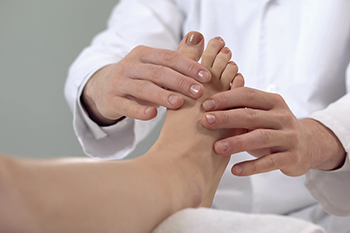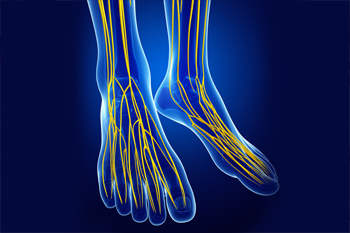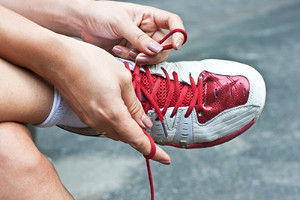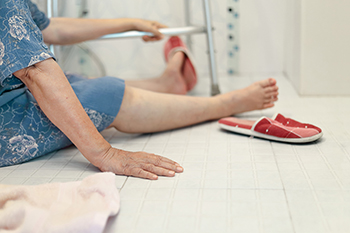Blog
Selecting Shoes For Your Child

As your toddler grows and matures, their feet are also growing and developing at the same time. Since your child’s feet are an important part of their body, selecting the right kind of shoe is imperative to maintaining overall foot health. This is true especially because the bones in a young child’s feet are still soft and ill-fitting shoes can exacerbate any existing foot deformities in a toddler. There are several things to keep in mind when shopping for your child’s shoes. First, you can be mindful of selecting shoes that have velcro straps. This can help ensure that both you and your child can keep the shoes fastened onto the feet. Second, you can look for shoes that have a spacious toe box, which will not crowd the child’s toes. Lastly, in terms of material, it can be important to select shoes that are made of breathable material, such as leather or mesh. This mesh is comparable to that used in running shoes. You may notice that a child will tend to grow out of their shoes at a seemingly rapid pace. However, it is nonetheless important to find shoes that are of high quality for your child. If you are concerned about your child’s shoes, please consult with a podiatrist who can help you.
Making sure that your children maintain good foot health is very important as they grow. If you have any questions, contact one of our podiatrists of Pennsylvania. Our doctors can provide the care you need to keep you pain-free and on your feet.
Keeping Children's Feet Healthy
Having healthy feet during childhood can help prevent medical problems later in life, namely in the back and legs. As children grow, their feet require different types of care. Here are some things to consider...
Although babies do not walk yet, it is still very important to take care of their feet.
Avoid putting tight shoes or socks on his or her feet.
Allow the baby to stretch and kick his or her feet to feel comfortable.
As a toddler, kids are now on the move and begin to develop differently. At this age, toddlers are getting a feel for walking, so don’t be alarmed if your toddler is unsteady or ‘walks funny’.
As your child gets older, it is important to teach them how to take care of their feet.
Show them proper hygiene to prevent infections such as fungus.
Be watchful for any pain or injury.
Have all injuries checked by a doctor as soon as possible.
Comfortable, protective shoes should always be worn, especially at play.
If you have any questions please feel free to contact one of our offices located in Plymouth Meeting and Ambler, PA . We offer the newest diagnostic and treatment technologies for all your foot and ankle needs.
Pinched Nerves Can Cause a Variety of Uncomfortable Symptoms

A pinched, or compressed, nerve can occur anywhere in your foot, such as in the heel, ball, or even on the bottom. A pinched nerve can produce pain or sensations of tingling, numbness, weakness, or the feeling that your foot has fallen asleep. The pain may radiate out to the toes or arches and become noticeable after exercising, walking, or standing for a while. What causes a nerve in your foot to become pinched? Injuries, medical conditions, tight ligaments, inflamed tendons, wearing tight shoes, obesity, or nerve entrapment conditions such as Morton’s neuroma. Switching footwear, resting, icing, immobilizing the area, or massaging it can sometimes provide temporary relief. However, if the symptoms persist or worsen, a podiatrist should examine your foot and run tests to determine the cause of your condition. Taking prompt, appropriate action will help reduce the risk of permanent nerve damage.
Foot Pain
Foot pain can be extremely painful and debilitating. If you have a foot pain, consult with one of our podiatrists from Pennsylvania. Our doctors will assess your condition and provide you with quality foot and ankle treatment.
Causes
Foot pain is a very broad condition that could be caused by one or more ailments. The most common include:
- Bunions
- Hammertoes
- Plantar Fasciitis
- Bone Spurs
- Corns
- Tarsal Tunnel Syndrome
- Ingrown Toenails
- Arthritis (such as Gout, Rheumatoid, and Osteoarthritis)
- Flat Feet
- Injury (from stress fractures, broken toe, foot, ankle, Achilles tendon ruptures, and sprains)
- And more
Diagnosis
To figure out the cause of foot pain, podiatrists utilize several different methods. This can range from simple visual inspections and sensation tests to X-rays and MRI scans. Prior medical history, family medical history, and any recent physical traumatic events will all be taken into consideration for a proper diagnosis.
Treatment
Treatment depends upon the cause of the foot pain. Whether it is resting, staying off the foot, or having surgery; podiatrists have a number of treatment options available for foot pain.
If you have any questions, please feel free to contact one of our offices located in Plymouth Meeting and Ambler, PA . We offer the newest diagnostic and treatment technologies for all your foot care needs.
Running Shoes for Specific Arches

Running shoes are worn for various reasons that can range from training for a marathon to getting in shape. The right shoes will fit correctly from the beginning and will not need a break-in period. It helps to wear shoes that have approximately a half inch of space between the top of the shoe and the top of the toe. This can help to improve comfort as running can negatively impact the feet. A shoe that fits slightly tighter is the running preference for speed. This type of shoe may provide a heel that is form-fitting and can hold the foot in place easily. It is important to be aware of the kind of arch the foot has and there are different types of running shoes that can be accommodating. Neutral running shoes will benefit those people who have medium arches and offer added shock absorption. People who have low or flat arches may want to choose stability running shoes as they may be helpful in minimizing overpronation. Motion control shoes can help runners who have excessive pronation since these shoes can help to stabilize the foot. A podiatrist is qualified in determining what type of running shoes are best for you, and it is suggested that you speak with this type of doctor who can provide you with correct information.
If you are a runner, wearing the right running shoe is essential. For more information, contact one of our podiatrists from Pennsylvania. Our doctors can provide the care you need to keep you pain-free and on your feet.
Choosing the Right Running Shoe for Your Foot Type
To increase performance and avoid the risk of injury, it is important to choose the right running shoe based on your foot type. The general design of running shoes revolves around pronation, which is how the ankle rolls from outside to inside when the foot strikes the ground.
- Neutral runners are able to choose from a wide variety of shoes, including minimalist shoes or even going barefoot.
- Runners who overpronate, or experience an over-abundance of ankle rolling, should choose shoes that provide extra motion control and stability.
- Runners who underpronate, or supinate, have feet that have high arches and lack flexibility, preventing shock absorption. They require shoes with more flexibility and cushion.
If you have any questions please feel free to contact one of our offices located in Plymouth Meeting and Ambler, PA . We offer the newest diagnostic and treatment technologies for all your foot and ankle needs.
Three Tips for Preventing Falls

As an individual gets older and older, their risk of suffering a dangerous trip or fall increases. Many things can make seniors more likely to trip. For example, having poor eyesight and taking medication that makes one feel dizzy as a side effect can increase their likelihood of falling. However, many factors are related to the feet that can also make falling likely. For example, ill-fitting footwear that is either too loose, bulky, or slippery can be dangerous. Instead of wearing this kind of footwear, it is recommended that seniors try to use shoes with non-slip soles. This will enable the senior to get a better grip on the ground, making tripping less probable. Additionally, to prevent falls at the very beginning of the day, a senior might consider ensuring that their feet can easily touch the floor from a seated position on their bed. When a senior takes their first steps of the day, they must do everything they can to increase their stability. Having their feet comfortably reach the floor from their bed is a great start. They might even try sitting in an upright position for a few minutes before putting their weight on their feet at the beginning of the day to stimulate blood flow. All of this makes falling less likely when taking the first steps of the day. If you are a senior looking to prevent a dangerous fall, contact a podiatrist.
Preventing falls among the elderly is very important. If you are older and have fallen or fear that you are prone to falling, consult with one of our podiatrists from Pennsylvania. Our doctors will assess your condition and provide you with quality advice and care.
Every 11 seconds, an elderly American is being treated in an emergency room for a fall related injury. Falls are the leading cause of head and hip injuries for those 65 and older. Due to decreases in strength, balance, senses, and lack of awareness, elderly persons are very susceptible to falling. Thankfully, there are a number of things older persons can do to prevent falls.
How to Prevent Falls
Some effective methods that older persons can do to prevent falls include:
- Enrolling in strength and balance exercise program to increase balance and strength
- Periodically having your sight and hearing checked
- Discuss any medications you have with a doctor to see if it increases the risk of falling
- Clearing the house of falling hazards and installing devices like grab bars and railings
- Utilizing a walker or cane
- Wearing shoes that provide good support and cushioning
- Talking to family members about falling and increasing awareness
Falling can be a traumatic and embarrassing experience for elderly persons; this can make them less willing to leave the house, and less willing to talk to someone about their fears of falling. Doing such things, however, will increase the likelihood of tripping or losing one’s balance. Knowing the causes of falling and how to prevent them is the best way to mitigate the risk of serious injury.
If you have any questions, please feel free to contact one of our offices located in Plymouth Meeting and Ambler, PA . We offer the newest diagnostic and treatment technologies for all your foot care needs.
